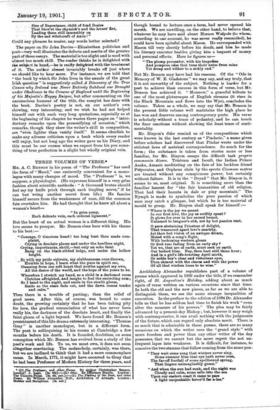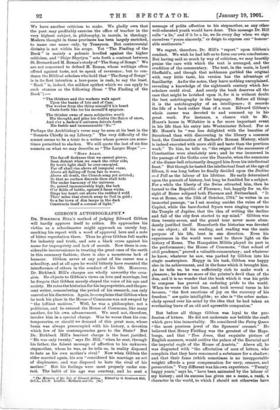THREE VOLUMES OF VERSE.* MR. A. C. BENSON in his
poem of "The Professor" has used the form of "Maud," one eminently convenient for a mono- logue with many changes of mood. The " Professor " is, we suppose, a physiologist. (He expresses himself in a very grim fashion about scientific methods : "A thousand brutes should feel my icy knife prick through each tingling nerve," if he can but wring another secret from life.) He fancies himself secure from the weaknesses of man, till the common fate overtakes him. He had thought that he knew all about a woman's heart- " In grim array, Each delicate vein, each ordered ligament."
But the heart of an actual woman is a different thing. His love seems to prosper. Mr. Benson rises here with his theme to his best :— " Courage, 0 timorous heart ! too long hest thou made com- plaint,
Crying in desolate places and under the heedless night, Crying, importunate, shrill,—but only an echo faint
Rang on the black-ribbed ledge, and under the hollow height.
_ So with My pride outworn, my stubbornness over thrown -Humble in hope, I learn what the pure in spirit see, Guessing from one soft heart that nestles against my own, All the desire of the world, and the hope of the years to be.
Wherefore I stretch my hand, as a child in a darkened room Clutches affrighted, and laughs to feel the encircling arm ; So I bend to the night, and smile in the starlit gloom,
Smile as the stars fade oat, and the dawn comes tender
and calm."
Then there is a trouble of parting ; then the relief of good news. After this, of course, was bound to come doubt, the growing certainty that he has been taking pity for love, the gradual renunciation of what has never been really his, the darkness of the desolate heart, and finally the faint gleam of a light beyond. We have found Mr. Benson's preaehtnihntof this life-drama extremely interesting. "Thomas Gray" is another monologue, but in a different form. The poet is soliloquising in. his rooms at Cambridge a few months before his death. It is founded, doubtless, on some conception which Mr. Benson has evolved from a study of the poet's work and life. To us, we must own, it does not seem altogether convincing. The melancholy, certainly, was there, but we are inclined to think that it had a more commonplace cause. In March, 1771, it might have occurred to Gray that he had been Professor of Modern History for three years, and
• Mt.The PrOfeesor • end, ofiter..zioems. By us Christopher Benson. Lean. . J. Lane. 6thl--(2.) Odes. By Iliusape Mayon. London: The trnicorn,Press. t2. ad. net. ma Boling Of the Book, and other
Poems. By WU= Alexander, D.D., Archbishop of Armagh. London: Redder and Stoughton. [6s. net]
though bound to lecture once a term, had never opened his mouth. We are unwilling, on the other hand, to believe that, whatever he may have said about Horace Walpole (to whom, according to one account, he was never really reconciled), he could have been spiteful about Mason. He corresponded with Mason till very shortly before his death, and him he made his literary executor besides giving him a bequest of money and personal effects. Here he figures as- " The plump precentor, with his tragedies And pompous odes that tune their notes from mine Yet droop and wither to a sickly end."
But Mr. Benson may have had his reasons. Of the "Ode in Memory of W. E. Gladstone" we may say, and say truly, that it is not unworthy of the subject. Nothing is harder for a poet to achieve than success in this form of verse, but Mr. Benson has achieved it. " Monnow," a graceful tribute to one of the most picturesque of English streams (it rises in the Black Mountain and flows into the Wye), concludes the volume. Taken as a whole, we may say that Mr. Benson in the present little volume well maintains the high place he has won and deserves among contemporary poets. His verse is scholarly without a trace of pedantry, and he can touch the finer emotions without showing the least trace of senti- mentality.
Mr. Binyon's Odes remind us of the compositions which were known in the last century as "Pindaric," a name given before scholars had discovered that Pindar wrote under the strictest laws of metrical correspondence. So much for the form ; the substance is taken from stories more or less familiar, for Mr. Binyon essays the difficult task proprie communia 'clicere. Tristram and Isoult, the Indian Prince Asoka, Amasis meditating on the fate of his luckless friend Polycrates, and Orpheus slain by the spretx Ciconum matres are treated without any conspicuous power, but certainly without failure. It is in the " Dryad " that Mr. Binyon is, it seems to us, most original. It is something more than the familiar lament for "the fair humanities of old religion,
That had their haunts in dale or piny mountain." The Nymph is made to symbolise the pure passion of which man may catch a glimpse, but which he is too material of mould to grasp. Mr. Binyon shall speak for himself :—
" Where is the joy we meant
In our first love, the joy se swiftly spent ?
It glows for ever in her sacred breast, Untamed to languor's ebb, not by hot passion rent.
0 pure abstaining Priestess of delight, That treasurest apart love's sanctity, Art thou but vision of an antique dream, Mated with a song's flight, With beckoning western gleam Or first rose fading from an early sky P Yet we, that are of earth, must seek on earth
Our bodied bliss. Nay, thou hest still thine hour;
And in a girl's life-trusting April mirth, Or noble boy's clear and victorious eyes, Thou shinest with the charm and with the power Of all that wisdom loses to be wise."
Archbishop Alexander republishes part of a volume of poems which appeared in 1886 under the title, if we remember
right, of St. Augustine's Holiday, adding about as much again of verse written on various occasions since that time.
In both the old and the new pieces, as far as we are able to distinguish them, we see the same strange inequalities of execution. In the preface to the edition of 1884 Dr. Alexander tells us that he has seldom had time to finish his work "even after the measure of his powers." The plea may be fairly advanced by a present-day Bishop ; but, however it may weigh with contemporaries, it can avail nothing with the judgments of the future, which can regard only absolute merit. There is so much that is admirable in these poems, there are so many occasions on which the writer uses the "grand style" with more freedom and power than any other writer of the day possesses, that we cannot but the more regret the not un- frequent lapse into weakness. It is difficult, for instance, to conceive the two stanzas that follow coming from the same pen: "They wait some song that winters never sing,
Some summer blue that eye bath never seen, The far-off footfall of some spellbound spring, That lingers unimaginably green."
"And when the sun had sunk, and the night was Cloudy and calm, some mile into the sea Upon our eastern coast it came to pass A light unspeakable hoveed fax a-lee."
We have another criticism to make. We gladly own that the poet may profitably exercise the office of teacher in the very highest subject, in philosophy, in morals, in theology. Modern thought in these provinces has been largely enriched, to name one name only, by Tennyson. But controversial divinity is not within his scope. Yet "The Finding of the Book" is mainly a polemic levelled against the higher criticism, and " Shiyr Shyriym " sets forth a contrast between St. Bernard and M. Renan's study of "The Song of Songs." We are not concerned to defend M. Renan, whose writings often offend against taste, not to speak of reverence ; but to con- demn the Biblical scholars who hold that "The Song of Songs" is in its first intention a love-poem is rash, to say the least.
" Rash " is, indeed, the mildest epithet which we can apply to such stanzas as the following (from "The Finding of the Book") :—
" The thinkers and the workers walk apart Upon the banks of Isis and of Cam.
The worker from the thing miscalrd his heart Casts forth like ice his morsell'd epigram.
The thinker owns of mere subjective worth His thought, and piles his doubts like flakes of snow, And o'er a darken'd universe drivels forth His feeble and immeasurable No."
Perhaps the Archbishop's verse may be seen at its best in the "Sonnets Chiefly in my Library." The very difficulty of the sonnet seems to be a tonie to a writer whose powers are some- times permitted to slacken. We will quote the last of six fine sonnets on what we may describe as "The Larger Hope "
HOPE AGAIN.
The far-off darkness that we cannot pierce, Seen distant when we reach the other side; By love's light shall be over-canopied. Far off shall rise above all temporal curse, Above all falling-off from fair to worse, Above all death, the Church.song yet untried ; So that no surface discords then shall hide The under harmony of the universe. So, poised immeasurably high, the lark O'er fields of battle, upturn'd faces white, Sings her heart out above the redden'd wold Thro' miles that stretch away to God in gold ; So a far town of dim lamps in the dark Constructs itself a coronal of light."







































 Previous page
Previous page